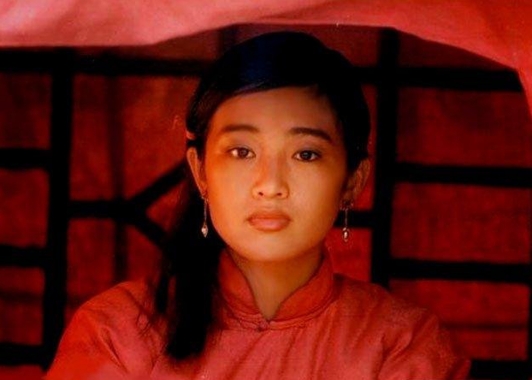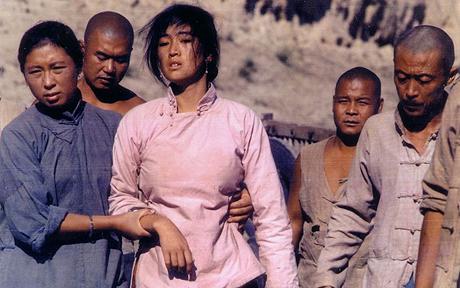By Christopher Bourne
Red Sorghum (Hong gao liang). 1987. Directed by Zhang Yimou. Written by Chen Jianyu, Zhu Wei, and Mo Yan, based on the novel “Red Sorghum Clan” by Mo Yan. Produced by Wu Tian-ming. Cinematography by Gu Changwei. Music by Zhao Jiping. Art direction by Yang Gang.
Cast: Gong Li (Jiu’er), Jiang Wen (Yu), Liu Ji (Father), Teng Ru-jun (Luohan), Ji Cun-hua (Sanpao).
Adapted from a section of Red Sorghum Clan, a multi-volume novel by Mo Yan, this year’s recipient of the Nobel Prize in literature, Zhang Yimou’s 1987 film Red Sorghum put the Fifth Generation of Chinese filmmakers solidly on the world cinema map. (Remarkably, this was a fast book-to-film adaptation; both the novel and the film version were released in the same year.) Winning the Golden Bear at the 1988 Berlin International Film Festival, Red Sorghum was an auspicious debut for both cinematographer-turned-director Zhang and its young lead actress Gong Li. Zhang would go on to make more accomplished films, and Gong would grow more into the luminous beauty she is today, but Red Sorghum shows that they were beginning from an already elevated level.
Red Sorghum is set in the 1920s and 1930s in Shandong, a northeastern province of China. This is immediately set up as a memory piece, through the voiceover of a man who tells us that what we are seeing will show how his grandparents met and how his father was conceived. The unnamed and unseen narrator’s grandmother is Jiu’er (Gong Li), or “Nine,” whom we first see getting ready to be taken by a palanquin to her new husband, a leprous older wine merchant named Li Datou. This is an arranged marriage set up by her parents, and one she is an unwilling participant in. As the title indicates, red is an important and dominant color in the film, and this is the color of the interior of the sedan, as well as the color of the veil placed over Jiu’er’s head during the trip.
The narrator tells us that his grandfather is Yu (Jiang Wen), one of the men hired to carry Jiu’er to her husband. In a sequence that introduces the earthy bawdiness of this tale, Yu leads the rest of the muscular, shirtless men in a song that attempts to get a rise out of the impassive Jiu’er, as they tease her about her marriage, and jostle the car violently about as they sing. Jiu’er’s sobs and impending motion sickness eventually get them to stop. The travelers are soon waylaid by a bandit who tries to rob them and rape Jiu’er. Jiu’er, who has been exchanging surreptitious glances at Yu through the whole trip, throws bold glances at him as she is ordered out of the car by the bandit, wordlessly challenging him to save her. Yu rises to the occasion, overpowering the bandit with the help of the other men. Later in the film, after Jiu’er has been living at the winery for some time, Yu, wearing a bandit’s mask, abducts Jiu’er on her way home from a visit to her parents, and in a scene with intimations of rape (although Jiu’er doesn’t seem to be unwilling), he proceeds to have sex with her in a Sorghum field. This, the narrator tells us, is where his father was conceived.
Jiu’er, despite being forced into marriage, and twice carried by men in their arms like a potato sack, is no mere passive victim. She is a headstrong, argumentative woman, who at one point condemns her father for essentially selling her to an older man in exchange for a new mule. After Li Datong is murdered offscreen under mysterious circumstances (the narrator suspects his grandfather, though we never learn who did it), Jiu’er takes over the winery, and in contrast to their previous dictatorial owner, runs it as a collective with the workers as equal partners with her. This puts Red Sorghum solidly on good footing with Communist ideology, as the proletariat defeats evil capitalism, at least for a time. Yu drunkenly returns to proclaim himself Jiu’er’s new husband; though she throws him out at first, he is later able to claim his prize, after peeing in the vats of wine, which (in an example of the film’s bawdy and absurd humor) improves the flavor of the wine, and contributes to the great success of the winery.
Red Sorghum takes a dramatic shift from the humorous, almost fairy-tale quality of the earlier sections, to a much more violent and tragic tone, as the Japanese invade China, destroying the winery in the process. This shift is abrupt and awkwardly handled, highlighting the narrative weaknesses of the film. The Japanese are portrayed as violent and sadistic oppressors, punishing men by having them hanged and skinned alive like animals, and forcing the Chinese to do this to their own. Jiu’er and Yu lead an attempt to fight back against the Japanese, which sets the stage for the tragic ending to the film.
Red Sorghum has been justly celebrated for its visual quality; Zhang’s experience as a cinematographer makes sure that the film is no less than ravishing in its sensual use of color. For this film, Zhang employed Gu Changwei, another talented cinematographer who went on to become a remarkable director himself. The natural beauty of the landscape, the nearly documentary-like details of the wine production, and the full use of the symbolism of the color red – blood, the Japanese flag, the final red-drenched closing scenes – all of this makes Red Sorghum a veritable feast for the eyes.
The performances in the film are just as riveting as the visuals. Gong Li, though she would make a greater impression in later films by Zhang and others, is already in full command of the screen, a master of the portentous glance and sensual expression. Her ecstatic expression as she is seduced by Yu is one of the film’s most memorable shots. Jiang Wen as Yu wonderfully conveys the brutal animal-like nature of his character, although he is not portrayed as an evil person, and indeed displays heroic qualities throughout the film.
Red Sorghum screens at Asia Society, on 35 millimeter, on December 2, 4pm as part of the impressive film series “Goddess: Chinese Women on Screen,” which runs through December 8. For more information, visit Asia Society’s website.
For more, please visit: http://chrisbourne.blogspot.com
Follow us: https://www.facebook.com/AsianInNYFans for more film reviews and exciting events.



